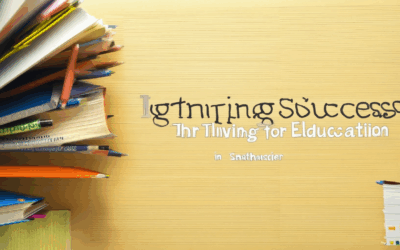Embarking on your college journey is an exhilarating milestone that combines excitement, curiosity, and a dash of overwhelm. To navigate this transformative period with confidence and ease, having a reliable guide is essential. Whether you’re a high school student preparing for the next chapter or someone looking to support aspiring scholars, this college readiness blog is designed to illuminate your path. From building a robust academic foundation to mastering time management and exploring the ins and outs of college readiness programs, we’ll delve into actionable strategies, insightful tips, and valuable resources that empower you to thrive. Discover how to stay organized, embrace new experiences, and leverage the wealth of tools available to ensure your college journey is nothing short of remarkable. Let’s embark on this adventure together, where knowledge meets opportunity, and your future shines brightly.
Key Takeaways
– Comprehensive Guidance: Look for blogs offering extensive coverage of topics like academics, applications, finances, and campus life to get a well-rounded perspective.
– Engagement and Relatability: Engage with content that uses personal stories, case studies, and interactive elements to make the material more relatable.
– Actionable Strategies: Prioritize blogs that provide practical tips, study hacks, and application strategies you can implement right away.
– Community Building: Seek out blogs fostering connections through forums, discussion groups, or guest posts from current students.
– Design and Usability: Choose blogs with clean, user-friendly designs, ensuring easy navigation and quick access to resources.
– SEO Optimization: Focus on blogs optimized for search engines with keyword-rich content, proper tagging, and meta descriptions.
– Regular Updates: Follow blogs that consistently post fresh, up-to-date content to stay informed about the latest trends and resources.
– Motivational Tone: Look for blogs with an encouraging and supportive tone to help you stay focused and inspired during your college journey.
– Platform Integration: Opt for blogs that integrate with social media, email newsletters, and other platforms to stay connected with the community.
– Expert Collaboration: Benefits from guest posts and interviews with educators, counselors, and admissions experts for credible insights.
– Event Resources: Access blogs hosting events, webinars, and workshops to stay informed about college readiness opportunities.
– User Contributions: Engage with blogs encouraging reader submissions for fresh, community-driven content.
– Accessibility Features: Ensure blogs are fully accessible, including screen reader compatibility and closed captioning for multimedia.
– Privacy Protection: Look for clear privacy policies to safeguard reader data.
Improving College Readiness: A Comprehensive Guide
College readiness encompasses a broad spectrum of skills, knowledge, and preparation necessary to succeed in higher education. To help you get started, here are some actionable strategies:
1. Build a Strong Academic Foundation
Challenge yourself by enrolling in advanced high school courses, particularly in subjects relevant to your college major. This will help you develop stronger analytical and problem-solving skills.
2. Stay Organized and Manage Time Effectively
Use tools like planners or digital calendars to keep track of assignments, exams, and events. Prioritize tasks based on their urgency and importance to avoid last-minute stress.
3. Develop Effective Study Habits
Regularly review your notes and practice topics thoroughly. Techniques like active recall and spaced repetition can enhance your ability to retain information long-term.
4. Prepare for Standardized Tests
Practice for exams like the SAT or ACT to familiarize yourself with the format and improve your test-taking strategies. Utilize online resources and study guides to maximize your performance.
5. Understand the College Application Process
Research colleges that align with your interests and goals. Learn about application deadlines, required materials, and essay writing tips to submit a competitive application.
6. Plan Finances Strategically
Explore financial aid options such as scholarships, grants, and student loans. Create a budget to cover tuition, textbooks, and living expenses to ensure financial stability during your studies.
7. Build a Support Network
Seek out mentors, advisors, and peers who can offer guidance and encouragement. Strong relationships can provide emotional support and practical assistance throughout your college journey.
8. Maintain Physical and Mental Health
Prioritize regular exercise, a balanced diet, and sufficient sleep to manage stress and maintain energy levels. Incorporate mindfulness practices to enhance mental well-being.
For additional resources and in-depth guides, visit Enroll Maven to discover expert tips and strategies tailored to your college preparation needs.
Key Steps to Prepare for College Success
Preparing for college is a significant milestone that requires careful planning and organization. Here are some essential steps to ensure you’re well-prepared for the challenges and opportunities ahead:
1. Develop a Strong Academic Foundation
Before diving into college coursework, it’s crucial to lay a solid groundwork. Start by:
- Setting Clear Goals: Define your short-term and long-term objectives. Whether it’s earning a degree or exploring specific fields, having a roadmap will keep you focused.
- Creating a Study Schedule: Allocate specific times for studying each subject. Consistency is key to mastering complex concepts.
- Mastering Study Techniques: Experiment with methods like active reading, summarization, and flashcards to find what works best for you.
2. Build a Support Network
College can feel overwhelming, so surrounding yourself with the right people is essential. Begin by:
- Finding Like-Minded Peers: Join study groups or online forums where you can connect with others facing similar challenges.
- Seeking Mentorship: Talk to teachers, counselors, or professionals in your field of interest for guidance and advice.
- Becoming Part of a Study Group: Collaborating with others can enhance your learning experience and make studying more enjoyable.
3. Stay Organized
Effective organization is vital for managing the demands of college life. Consider:
- Using Planners or Digital Tools: Tools like planners, calendars, or apps can help track assignments, exams, and deadlines.
- Managing Time Wisely: Break down tasks into smaller, manageable steps to avoid last-minute stress.
- Tracking Assignments and Deadlines: Keep a centralized location, whether digital or physical, to stay on top of everything.
4. Master Time Management
Time management is a cornerstone of college success. Effective strategies include:
- Prioritizing Tasks: Determine which tasks require immediate attention and which can be deferred.
- Avoiding Procrastination: Break large projects into smaller, achievable steps to maintain momentum.
- Balancing School with Life: Allocate time for hobbies, relaxation, and social activities to maintain mental well-being.
5. Understand College Policies and Resources
Colleges offer numerous resources to support student success. Familiarize yourself with:
- Academic Requirements: Understand course prerequisites, grading policies, and degree requirements.
- Office Hours and Tutoring Services: Take advantage of opportunities to seek additional help when needed.
- Campus Facilities and Services: Explore libraries, labs, and wellness centers designed to aid your academic journey.
6. Take Care of Your Mental Health
College can be stressful, so prioritizing your mental health is crucial. Make sure to:
- Manage Stress Effectively: Practice mindfulness, meditation, or yoga to reduce anxiety and stress.
- Get Adequate Sleep: Aim for 7-9 hours of quality sleep each night to support cognitive function and overall well-being.
- Reach Out for Help When Needed: Don’t hesitate to speak with counselors, professors, or trusted peers if you’re feeling overwhelmed.
By following these steps, you’ll be well-equipped to navigate the challenges of college and thrive in your academic journey. Remember, it’s not just about excelling academically but also about building resilience and adaptability along the way.
For additional resources and guides tailored to your needs, visit Enroll Maven . We provide in-depth articles, tips, and strategies to help you succeed in college and beyond.
Explore more valuable insights on Chegg and Quizlet for supplementary materials and study aids.
Essential Tips for College Readiness
College readiness is crucial for setting the foundation of your academic journey. Here are some proven strategies to help you excel:
- Develop a Strong Academic Foundation
- Establish consistent study habits to build discipline and retention.
- Review and understand your curriculum early to align your efforts with long-term goals.
- Seek guidance from teachers or mentors to identify strengths and areas needing improvement.
- Master Time Management
- Create a balanced schedule incorporating study time, extracurricular activities, and relaxation.
- Use tools like planners or digital calendars to stay organized and on track.
- Break tasks into manageable chunks to avoid feeling overwhelmed.
- Become an Active Learner
- Engage with course material through discussions, debates, and hands-on experiences.
- Ask questions and seek clarification early to avoid confusion later.
- Participate in study groups or collaborative projects to enhance understanding.
- Build a Support Network
- Foster relationships with peers, teachers, and mentors who can offer guidance and encouragement.
- Join clubs or organizations aligned with your interests to meet like-minded individuals.
- Stay connected with your high school counselor for updates and opportunities.
- Prepare for Standardized Tests
- Practice regularly using official practice tests to familiarize yourself with the format.
- Identify weak areas and focus on improving them through targeted study sessions.
- Utilize available resources like online tutorials and study guides to enhance your test-taking skills.
- Stay Healthy and Balanced
- Prioritize sleep, nutrition, and exercise to maintain physical and mental well-being.
- Manage stress through mindfulness, hobbies, or professional counseling if needed.
- Set realistic expectations and balance academics with social and recreational activities.
- Explore College Options
- Research various colleges and universities to find the best fit for your career goals.
- Visit campuses if possible to get a firsthand experience of the environment and programs.
- Consider dual enrollment or AP courses to earn credits earlier and gain a head start.
- Plan for Financial Aid
- Understand financial aid options including scholarships, grants, and loans.
- Complete the FAFSA application early to secure necessary funding.
- Explore work-study programs or part-time jobs to supplement income during college.
- Stay Curious and Motivated
- Keep curiosity alive by exploring new topics and staying engaged with your passions.
- Set both short-term and long-term goals to keep momentum and track progress.
- Remain open-minded to new opportunities and willing to adapt as circumstances change.
What Should You Look for in a College Readiness Blog?
To find the best college readiness blog, look for one that offers a combination of comprehensive guidance, engaging content, and actionable advice tailored to help you succeed in college. Here’s what to focus on:
- Comprehensive Content: Ensure the blog covers a wide range of topics, including academic success, application strategies, financial preparation, networking tips, real-life student experiences, and updates on higher education trends. This ensures you get a well-rounded perspective.
- Engagement and Relatability: Look for content that is not only informative but also engaging. Personal stories, case studies, and interactive elements can make the content more relatable and easier to connect with.
- Actionable Advice: The blog should provide practical tips and strategies that you can apply immediately. Whether it’s study hacks, time management techniques, or application tips, actionable advice is key to helping you thrive in college.
- Community Building: Check if the blog fosters a sense of community. Features like forums, discussion groups, or guest posts from current students can help you connect with others and gain valuable insights.
- Design and Usability: A good college readiness blog should have a clean, user-friendly design. Easy navigation, responsive layout, and quick access to valuable resources are essential for a seamless user experience.
- SEO Optimization: While not the most exciting aspect, good SEO practices ensure the blog is discoverable. Look for content that is keyword-rich, properly tagged with headings, and includes meta descriptions and alt texts for images.
- Regular Updates: A consistently updated blog shows that the content is current and relevant. Regular posts keep the audience engaged and ensure the information stays fresh and up-to-date.
- Tone and Motivation: The blog should have an encouraging and supportive tone. Content that motivates and inspires can help you stay focused and confident as you navigate the challenges of college life.
- Integration with Other Platforms: Many successful blogs integrate with social media, email newsletters, and other platforms to extend their reach. Following the blog on these platforms can help you stay connected with the community and receive updates.
By focusing on these elements, you can find a college readiness blog that not only provides valuable information but also supports your journey toward achieving your academic goals.
Essential Features of a College Readiness Blog
A high-quality college readiness blog serves as a valuable resource for students, parents, and educators, offering actionable advice, insights, and tools to navigate the complexities of college preparation. Here are the key features that make such a blog indispensable:
- Comprehensive Content: The blog should cover a wide range of topics, including academic strategies, social life, financial planning, career preparation, and more. This ensures that readers receive holistic support for their college journey.
- Well-Organized Categories: Use clear categories or tags to help readers easily navigate the content. Topics like “College Admissions” or “Study Tips” should be readily accessible.
- Engaging Discussions: Include a comment section to foster engagement among readers. This allows for peer-to-peer support and shared experiences, enriching the content with diverse viewpoints.
- Regular Updates: Maintain a consistent posting schedule to keep the audience informed about the latest developments in college readiness, such as application deadlines or new resources.
- SEO Optimization: Implement SEO best practices to ensure the blog ranks highly in search engine results. Use relevant keywords and meta descriptions to attract organic traffic.
- Multi-Media Content: Incorporate videos, infographics, and podcasts to cater to different learning styles. Visual and auditory content can make complex concepts more digestible.
- Social Media Integration: Link the blog to social media platforms to share content and engage with a broader audience. This can include Twitter threads, Instagram carousels, or LinkedIn articles.
- Expert Collaborations: Partner with educators, counselors, and admissions experts to provide guest posts or interviews. This adds credibility and unique insights to the blog.
- Event Calendar: Create a section listing upcoming events, webinars, and workshops related to college readiness. This helps readers stay informed about opportunities to learn more.
- User-Generated Content: Encourage readers to submit their own stories, tips, or questions. This fosters a sense of community and provides fresh content for the blog.
- Accessibility Features: Ensure the blog is fully accessible to individuals with disabilities, including screen reader compatibility and closed captioning for multimedia content.
- Privacy Policy: Include a clear privacy policy to reassure readers about how their data is handled, especially if personal information is collected through forms or comments.
What Makes a Great College Readiness Blog?
A great college readiness blog combines insightful content, engaging presentation, and practical advice to effectively guide students and families through the complexities of preparing for college. Here’s what sets an exceptional college readiness blog apart:
Comprehensive Content
- Covers a wide range of topics including academics, standardized testing, extracurricular activities, admissions strategies, financial planning, and campus life.
- Provides detailed guides, checklists, and resources tailored to different student needs and learning styles.
- Includes expert advice, real-world experiences, and actionable steps to help students stay organized and motivated.
Structured and Easy-to-Follow Format
- Uses clear headings and subheadings to organize content logically.
- Incorporates bullet points, infographics, and tables to break down complex information.
- Features step-by-step tutorials and quick tips for easy reference.
Engaging and Interactive Elements
- Includes interactive tools like quizzes, calculators, and planners to help students assess their readiness levels.
- Encourages reader participation through polls, Q&A sessions, and guest contributions.
- Shares success stories and interviews with current or former students to inspire and provide relatable insights.
Visual and Multimedia Enhancements
- Utilizes images, videos, and podcasts to cater to different learning preferences.
- Provides infographics and charts to simplify key concepts like college application timelines and financial aid options.
- Uses animations and screencasts to explain difficult topics in an accessible manner.
Relevant and Timely Information
- Stays updated with the latest trends in college admissions, testing policies, and financial aid programs.
- Offers seasonal content, such as tips for applying early decision or navigating college fairs.
- Provides guidance on emerging topics like online learning and virtual college tours.
Credibility and Authority
- Curates content from reputable sources, including official college guides, educational organizations, and industry experts.
- Features guest posts from admissions counselors, college presidents, and successful alumni.
- Includes citations and references to support claims and provide evidence-based information.
SEO Optimization
- Uses strategically chosen keywords to improve search engine visibility.
- Implements proper on-page SEO techniques, such as optimizing title tags, meta descriptions, and header tags.
- Includes internal links to related articles and resources to enhance navigation and reduce bounce rates.
Community-Building Features
- Creates forums or discussion boards for students to connect with peers and share experiences.
- Hosts live webinars, workshops, and Q&A sessions with college representatives and mentors.
- Encourages readers to share their own college journey stories and tips.
Feedback and Iteration
- Includes surveys and feedback forms to gather input from readers.
- Regularly updates content based on reader suggestions and changing needs.
- Continuously improves the blog’s design, functionality, and user experience.
By combining these elements, a great college readiness blog becomes a trusted resource that not only informs but also inspires and empowers students to take control of their college journey.









0 Comments